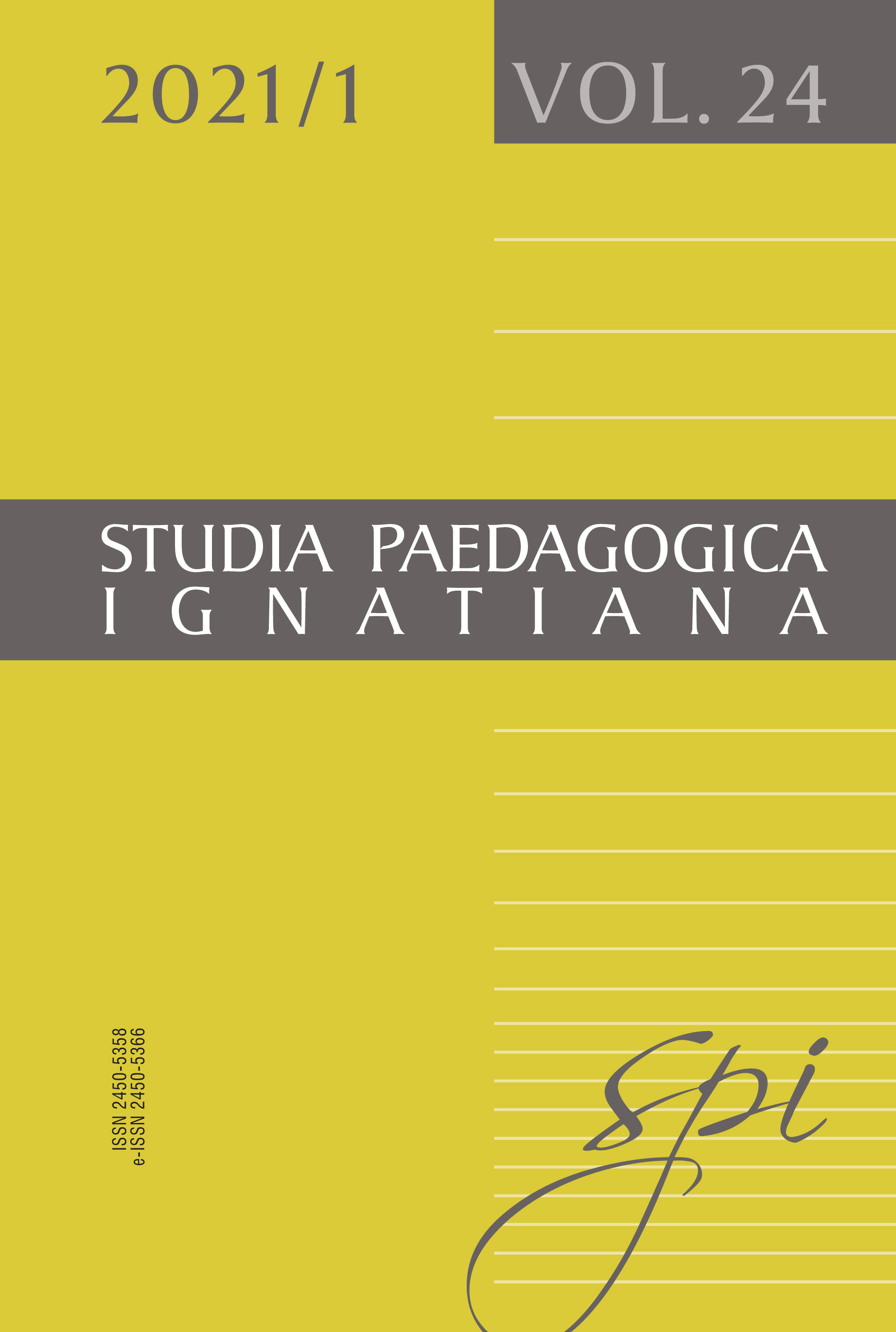The Smartphone in Fulfilling Spiritual Needs:
A Contemporary Challenge for the Church
DOI:
https://doi.org/10.12775/SPI.2021.1.006Keywords
spiritual needs, religion, spirituality, Church, smartphone, mass mediaAbstract
The author puts forward the thesis that a smartphone can be a means to satisfying the spiritual needs of today’s believers. He also asks whether the Church of today is prepared for new challenges in the field of pastoral care through mass media. He shows what spirituality in Western culture is, which has its roots in the Bible. On the other hand, the sociology of religion, describing religiousness both in individual and collective dimensions, shows spirituality as a form of religious experience, an important component of a deepened religious life in which human spiritual needs play an important role. The author points out that there is a need for more extensive research on contemporary forms of meet-ing spiritual needs in the Church. The coronavirus pandemic has shown that it is possible to participate in liturgy and other religious practices through mass media, including via a smartphone. Is it possible, for ex-ample, to give a plenary indulgence to people who were not physically present in church; is it possible to confess through a smartphone? Contemporary social problems and new technological opportunities should be the starting point for reflection on traditional forms of religiosity and on the means used by the Church in its pastoral activity.
References
Borowik I. (2004), Prywatyzacja religii, [w:] Leksykon socjologii religii, red. M. Libiszowska-Żółtkowska, J. Mariański, Warszawa: Wydawnictwo Verbinum, s. 320–322.
Dobroczyński B. (2008), Kłopoty z duchowością. Szkice z pogranicza psychologii, Kraków: Zakład Wydawniczy Nomos.
Franciszek (2019). Orędzie papieża Franciszka na VIII Światowy Dzień Środków Społecznego Przekazu. „Wszyscy tworzymy jedno” (Ef 4,25). Od wirtualnych wspólnot społecznościowych do wspólnot ludzkich, Watykan, 24 stycznia 2019 roku, www.vatican.va/content/francesco/pl/messages/communications/documents/papa-francesco_20190124_messaggio-comunicazioni-sociali.html [dostep: 21.03.2020].
Gałdowa A. (1990). Rozwój i kryteria dojrzałości osobowej, „Przegląd Psychologiczny”, t. 33, nr 1, s. 13–27.
Górski K. (1986). Zarys dziejów duchowości w Polsce, Kraków: Znak.
Grotowska S. (1999), Religijność subiektywna. Studium socjologiczne na podstawie wywiadów narracyjnych, Kraków: Zakład Wydawniczy Nomos.
Grzegorczykowa R. (2006). Co o fenomenie duchowości mówi język? Fenomen duchowości, [w:] Fenomen duchowości, red. A. Grzegorczyk, J. Sójka, R. Koschany, Poznań: Wydawnictwo Naukowe UAM, s. 21–28.
Heszen-Niejodek I. (2003). Wymiar duchowy człowieka a zdrowie, [w:] Zasoby osobiste i społeczne sprzyjające zdrowiu jednostki, red. Z. Juczyński, N. Ogińska-Bulik, Łódź: Wydawnictwo Uniwersytetu Łódzkiego, s. 33–47.
Jan Paweł II (1998). Być człowiekiem sumienia, wybór i opracowanie K. Gryz, Kraków: Wydawnictwo M.
Kreppold G. (2011). Kryzys – punkt zwrotny w życiu, Kraków: Wydawnictwo Salwator.
Leszczyńska K., Pasek Z. (2008). Nowa duchowość w badaniach społecznych, [w:] Nowa duchowość w społeczeństwach monokulturowych i pluralistycznych, red. K. Leszczyńska, Z. Pasek, Kraków: Zakład Wydawniczy Nomos, s. 9–20.
Marcyński K. (2020). Czy w seminarium potrzebny jest smartfon?, https://misyjne.pl/czy-w-seminarium-potrzebny-jest-smartfon-rozmowa/ [dostep: 21.03.2020].
Pargament I.K. (1997). The Psychology of Religion and Coping: Theory, Research, Practice, New York: Guilford Press.
Socha P. (2003). Na tropach duchowości – czym jest i czym może być duchowość? „Nomos. Kwartalnik Religioznawczy”, nr 43–44, s. 19–39.
Szlachcicowa I. (2010). Duchowość jako przedmiot badań socjologicznych – refleksje metodologiczne, [w:] Religijność i duchowość – dawne i nowe formy, red. M. Libiszowska-Żółtkowska, S. Grotowska, Kraków: Zakład Wydawniczy Nomos, s. 217–230.
Wulff D. (1999). Psychologia religii. Klasyczna i współczesna, przeł. P. Jabłoński, M. Sacha-Piekło, P.M. Socha, Warszawa: Wydawnictwa Szkolne i Pedagogiczne.
Zohar D., Marshall I. (2001). Inteligencja duchowa. Najwyższa z inteligencji, przeł. P. Turski, Poznań: Dom Wydawniczy „Rebis”.
Downloads
Published
How to Cite
Issue
Section
License
Copyright (c) 2021 Studia Paedagogica Ignatiana

This work is licensed under a Creative Commons Attribution-NoDerivatives 4.0 International License.
By submitting an article, the author declares that:
they are the author of the article (hereinafter referred to as the Work) and:
- is entitled to exclusive and unlimited copyright to the Work,
- is entitled to dispose of the copyrights to the Work.
The Author grants the Jesuit University Ignatianum in Cracow a free, non-exclusive, territorially unlimited license to use the Work in the following fields of exploitation:
- publishing the Work in paper, digital or magnetic form;
- multiplying the work by any method, without limiting the number of editions or copies;
- distribution of the work and its copies in any form, including marketing, sales, lending, and lease;
- placing the work in a computer memory;
- distribution of the work in information networks, including the Internet;
- public performance, exhibition, display, reproduction, broadcasting and re-broadcasting, as well as making the Work available to the public in such a manner that everyone could have access to it at a time and place chosen by themselves;
- within the scope of dependent rights to the Work, covering, in particular, the right to make necessary changes to the Work, resulting from editorial and methodical preparation, as well as to make translations of the Work into other languages.
The license right shall be transferred the moment of transfer of the Work to the Jesuit University Ignatianum in Cracow. The Jesuit University Ignatianum in Cracow is entitled to grant sub-licenses to the Work in terms of the right granted. The license shall be limited in time for a period of 15 years from the date it is granted.
Stats
Number of views and downloads: 435
Number of citations: 0



